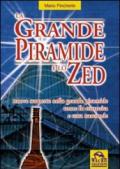
Archetipi. Le chiavi dell'universo
Pincherle Mario
Archetipi. Le chiavi dell'universo: Gli Archetipi sono i ventidue strumenti con i quali Dio ha "progettato e dipinto l'universo". Gli Archetipi sono "funzioni" basilari della vita che vanno ad intersecare suoni, lettere, colori, disegni, pensieri e azioni. Ogni aspetto creativo dell'universo è semplificabile a tal punto da corrispondere a una delle innumerevoli combinazioni di questi segni sacri. Nell'antichità, gli Archetipi erano conosciuti e usati, su di essi furono costruiti i primi linguaggi; anche Socrate e Platone erano consapevoli della loro esistenza ed erano in grado di usarli, ottenendo così una comprensione profonda dei fatti della vita. Finché non capirà il significato degli Archetipi, l'uomo sarà dualista, in perenne lotta fra il bene e il male. "Col pensiero dialettico non si è risolto nessun problema, ma, uscendo dalle forme e osservando il proprio pensiero e i suoi Archetipi, l'uomo sta per scoprire di avere la stessa matrice universale da cui sono nati tutti gli esseri viventi e da cui è uscito l'intero cosmo. Il piccolo uomo comincia a scoprire il Grande Uomo, quello che non ha confini. E ne sente la voce". La stessa che hanno sentito e trasmesso tutti i pionieri degli Archetipi. Archetipi: ne aveva già parlato Socrate a Platone definendoli "i mattoni del pensiero", oltre lo spazio e il tempo, immagini eterne e viventi. Ma altri saggi dell'antichità come Abramo, Akhenaton o Pitagora se ne occuparono nel corso della loro vita, così come anche nella nostra storia recente ci sono stati esempi di noti studiosi come F. Myers, D. Diringer, C.G. Jung che hanno cercato di dipanare l'intricata matasThe archetypes are the twenty-two instruments with which God has "designed and painted the universe." Archetypes are the basic "functions" of life that intersect sounds, letters, colors, drawings, thoughts and actions. Every creative aspect of the universe can be simplified to such an extent that it corresponds to one of the countless combinations of these sacred signs. In antiquity, the archetypes were known and used, the first languages were built on them; Even Socrates and Plato were aware of their existence and were able to use them, thus obtaining a profound understanding of the facts of life. Until he understands the meaning of the archetypes, the man will be dualistic, in constant struggle between good and evil. "With dialectic thought, no problem has been solved, but, coming out of the forms and observing its own thought and its archetypes, man is about to discover that he has the same universal matrix from which all living beings were born and from which the whole cosmos came out. The little man begins to discover the great man, the one who has no boundaries. and hears its voice. " The same one who heard and conveyed all the pioneers of the archetypes. Archetypes: Socrates had already talked about it to Plato, calling them "the bricks of thought", Beyond space and time, eternal and living images. But other wise men of antiquity like Abraham, Akhenaton or Pythagoras were occupied in the course of their lives, as well as in our recent history there have been examples of well-known scholars such as F. Myers, D. Diringer, C.G. Jung who tried to unravel the intricate Matas
Al momento non disponibile, ordinabile in 3 settimane circa
Dettagli Libro
- Titolo: Archetipi. Le chiavi dell'universo
- Autore: Pincherle Mario
- Curatore:
- Traduttore:
- Illustratore:
- Editore: Macro Edizioni
- Collana: ANTICHE CONOSCENZE
- Data di Pubblicazione:
- Pagine: 271
- Formato:
- ISBN: 9788828504573
- Non catalogati - Non catalogati
Libri che ti potrebbero interessare

Archetipi. Le chiavi dell'universo
Pincherle Mario

Il quinto Vangelo. Il Vangelo di Tommaso...
Pincherle Mario

La grande piramide e lo Zed. Nuove scope...
Pincherle Mario

La casa del padre. Mario Pincherle nei r...
Ada Pincherle

La Grande piramide e lo Zed
Pincherle Mario

Acquario. Canzoni e suggestioni per il t...
Ducci Riccardo, Pincherle Mario

La vita e i suoi archetipi. Incontro con...
Corradi Tiziana, Pincherle Mario

La vita e i suoi archetipi. Incontro con...
Corradi Tiziana, Pincherle Mario

Spazio, tempo e antitempo. Incontro con ...
Pincherle Mario

Il segreto di Rol
Pincherle Mario

Il libro di Abramo
Pincherle Mario

Il diavolo dalla bocca. Storia vera di u...
Pincherle Mario






